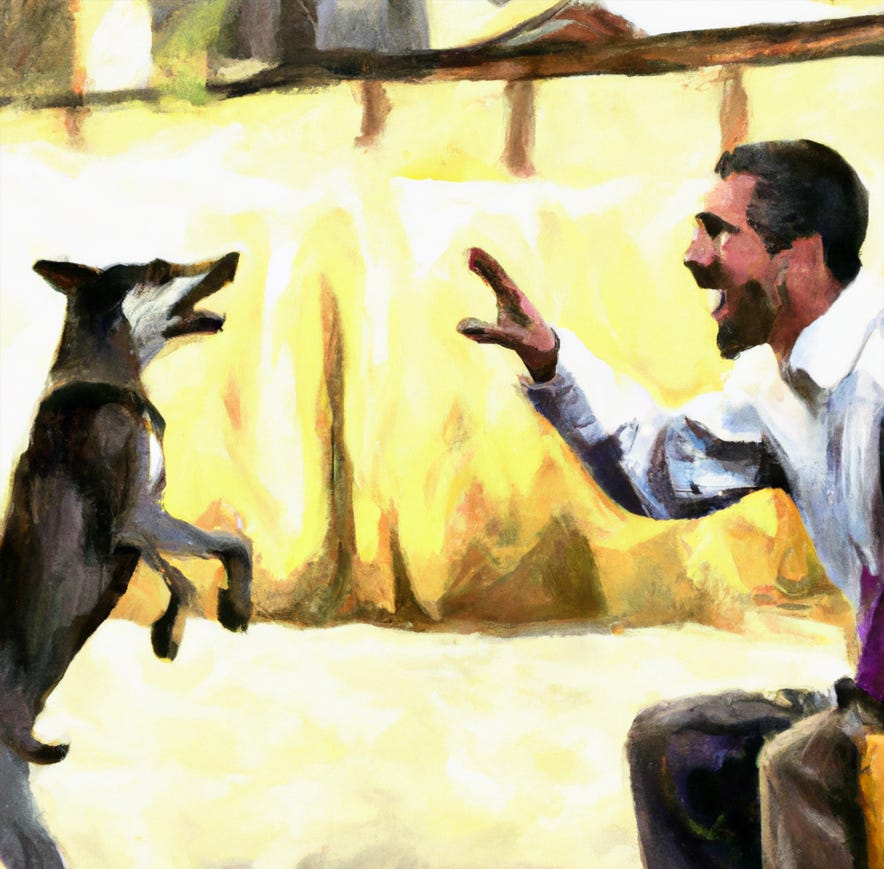Dad's Learning Part 13: Tell Me When A Rule Is Dumb (A Continuing Series)
I don't always need to bark.
It is better to debate a question without settling it than to settle a question without debating it.
Parenting With Style
So apparently there are parenting styles. This isn't exactly news but I hadn't ever thought about it. Not really. The wife and I spoke about this a few months ago when she had an essay for one of her classes dealing with soft parenting versus whatever the other type was. Of course, I am not very soft when addressing the kids if they have misbehaved, but I am actually attempting to do better about that.
I don't always need to bark.
But this came up early in the therapy session last week. We spoke on children and the pitfalls they need to avoid. Blind acceptance of authority was on my mind at the time. I cannot remember exactly how it segued into how I parent, though I suspect I saw an opportunity to talk and took it. As I do.
I have an authoritative parenting style. That is different than authoritarian, I was delighted to learn. It's not "My way or the highway" or "How dare you question me." Although some of the questions I get do leave me... flabbergasted. "Odd question to ask, young lady." But certainly not "how dare you?" I want them to question me if it's warranted.
I let them know if the rule is dumb, they should tell me. If they feel as though it's unfair or should be lifted, they can come to me and ask. We can have a dialectic and see if their views have enough merit to lift the rule, at least for them. However, I make the decision at the end as to whether it has merit. So it's not completely fair but neither is life.
I do want them to question me sometimes. I want them to be comfortable talking to me about things. I want them to be comfortable calling out bullshit. That seems right to me.
So I am authoritative because I do allow them a voice, but the buck stops with me. I have also advised them that before they break a rule, even if they think it's a silly rule, or even if it is shown to be a stupid, pointless rule, they better be prepared to deal with the consequences. They may bring light to a dumb rule by breaking it, but they still broke a rule.
It's a confusing sequence of words, to be sure, but it makes some sense to me. You know there are consequences of an action and you accept them before taking that action. That's pretty cut and dry. Perhaps your action will make it so the consequences are no longer there in the future, but currently they are in place. So accept it first, then act. Don't be surprised when punishment comes from breaking a rule.
So in essence, authoritative parenting gives the children a voice while still having a hard line. Authoritarian parenting says "shut up and do what I say, full stop." That just seems like a good way to push the kids away. I don't like that. I hope I am making the right decision. I guess time will tell there.
Forgiveness
Well, this topic again. I love this topic though. It has helped me tremendously in a short amount of time.
The question is, does forgiveness show self-love? Or, is it a sign there is self-love present?
I submit it proves there is love for the self present, even when it doesn't show itself in other ways. Forgiveness of others benefits the self. It pops the cork and allows the poison that is hatred and resentment to pour out of the container. Naturally the container is you in this metaphor. You wouldn't want to hold onto poison, so you want to get it out of your body. That's what forgiveness does when you forgive others. You benefit yourself and that's what you should do.
So if you take action to benefit you, presumably you show some self-love there. Self-forgiveness comes into play here too. Remembering that mistakes happen and you are human is important. That's an obvious act of self-love. One that we should all try and do from time to time.
Forgiveness is an intrinsic aspect of self-love. It's not all of it, but it shows that it exists and it helps to instill a more full form of it if practiced regularly. Self-care, self-improvement, and boundaries set are other aspects, of course, but those are hard to start without forgiveness and self-forgiveness. So give it a try from time to time.
But I submit forgiveness of yourself or others really shows courage. It requires courage. Holding onto resentment, blame, and hate gives you an out. It allows you to say someone else is responsible for your misery. But when you forgive (which as we know helps ourselves by releasing that poison) you take on the responsibility of your own suffering. You are stating that you are in charge of whether you are miserable or suffering and that there are actions you could take to ameliorate that misery or suffering.
So to forgive is to adopt responsibility, and that takes courage. Be courageous. Be forgiving. Dare to be whole and dare to be healed. You can do it.
When we take care of ourselves we are better able to take care of others. So as parents and people responsible for others it is required of us to practice forgiveness.



